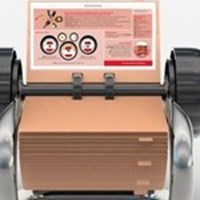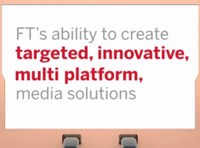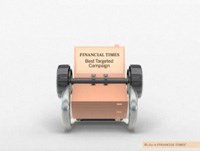Rolodex rolls out campaign

Specifically, the newspaper's mission was to educate EMEA clients about its ability to create targeted, innovative campaigns. Key to this was bringing the FT's unique research alive by using the FT GIST (Global Insight Studies) providing in-depth information not available on syndicated surveys. This offered advertisers an insight into their target audience and identified key attributes that trigger purchasing behaviour, therefore helping to shape campaign messages and improve ROI.
Taking the direct route
The paper decided direct mail would be the most effective delivery system. However, the challenge was to create something that would stand out above the avalanche of direct mail that fills the bins (both physical and electronic) of agencies and clients every day. To make it stand out, it needed to be premium, personalised, have a reusable digital element and provide valuable insights.

This campaign would prove to the recipient that the FTFT Rolodex Campaign was born.
The meticulous collection and use of data from advertisers as well as market information collected by ongoing studies like GIST is key to the paper's advertising offer and client communications.
By collecting data on the media buyers and planners it comes into contact with, the FT has a mass of information on these individuals' clients and the sectors in which they operate. The FT Rolodex Campaign's sophisticated communications strategy showed clearly how the FT's consumer and business insights could be used by planners and buyers to reach and engage with specific audiences.
The key message
The FT knew that to connect with this notoriously time-poor and sceptical audience, it needed to deliver a polished, visually arresting campaign via a bespoke, premium and targeted execution. As well as an attractive design, it would be updated on a regular basis using FT GIST to provide in-depth information not openly available to the market.
The key message the FT wanted to communicate to its audience was that this tool would make them better informed on their sectors. Therefore they would be able to refine their campaign messages using the FT's insights, and ultimately deliver improved ROI in a tough market.

The creative execution of the FT Rolodex Campaign centred on a highly personalised and targeted mailing. Over 1500 media buyers, planners and clients were sent a sterling silver business card holder, engraved with their initials. The unbranded container held a business card with their name, job title, company, and a web address which contained their name within the URL.
Personalised Rolodex
This URL took them to their own personalised online Rolodex. The tailored micro-site contained insights for the sectors they worked in, relevant case studies and tailored media solutions demonstrating how they could use a number of FT platforms to reach their target audiences. By thumbing through the virtual Rolodex, users could 'pull out' the pages that interested them and share with colleagues.
If they operated in the automotive sector, for instance, they could pull out a page that explained the four most important attributes when buying a car split by audience type valuable information an advertiser could use to plan and implement their campaign.
Driving the client to their customised webpage allowed the FT to deliver detailed information in a highly targeted and personalised way. Any recipients who hadn't visited their personalised micro-site within two weeks of receiving the card holder were sent an email directing them to it.
Results
B2B direct mail hit rates are generally less than 5%, but the FT achieved an engagement level of 51% with the Rolodex Campaign. In the first two months alone, half the users returned up to 25 times, spending more than two minutes on their personalised homepage each time.
The Rolodex Campaign brought in 27 new clients in the first four weeks, including McDonald's, Microsoft and Toshiba. It generated just under £500 000 in new revenue from corporate branding, lead generation and new product campaigns.
Anecdotal user feedback was equally impressive, with more than 50 clients contacting FT deputy CEO Ben Hughes in the first week with positive comments.
The campaign was shortlisted in the 2011 Festival of Media in the 'Best Targeted Campaign' category.
Why is this on Cream? A time-poor audience got new and valuable information that demonstrated how to deliver innovative cross platform campaigns to help achieve better results in a challenging market. The personalised and digital elements made it stand out, the premium execution perfectly reflected the FT brand, and the intelligent use of targeted insight brought the FT's advertising proposition to life.
Source: Cream: Inspiring Innovation
Cream is a curated, global case study gallery of excellence, providing the marketing community with the latest trends and inspiration to help grow their business.
Go to: http://www.creamglobal.com






